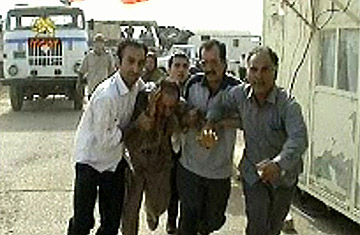
A video grab shows what appears to be an injured man being assisted by residents after a confrontation with Iraqi security forces at Camp Ashraf in Iraq on July 28, 2009
(2 of 2)
So why did Baghdad act now? The sudden escalation with Ashraf may have more to do with a bruised Iranian regime's bid to stamp out its opponents both at home and abroad than with any pressing Iraqi national interest. Iran's regime — roiled by continuing postelection unrest at home that poses the most serious threat to its rule since the 1979 Revolution — may have finally put its foot down regarding the MEK.
At the same time, it's a win-win for Iraqi Prime Minister Nouri al-Maliki, who gets to burnish his tough-guy credentials ahead of national elections early next year as well as please his allies, the ayatullahs. There's little love in Iraq for the MEK, which was welcomed by Saddam Hussein in the mid-'80s, when he was at war with Iran, and supplied with a training camp and armaments. The group is accused of repaying its benefactor by helping quash Kurdish and Shi'ite rebellions — charges the MEK has denied.
For now, the U.S. hasn't stepped into the fray, insisting that the situation is a matter for the Iraqi government to handle. "This is completely within their purview," State Department spokesman Ian Kelly told reporters in Washington, adding that the U.S. had received assurances that Baghdad would not forcibly transfer Ashraf's residents, especially to countries like Iran where they may face persecution or physical harm.
The MEK has long said that it will not leave its "home" in Ashraf. But on Monday it indicated — for the first time — that its members in Ashraf may be willing to return to Iran if strict, and many would say unrealistic, conditions are met. The group's elusive Paris-based leader, Maryam Rajavi, said in a statement that MEK members would return if Tehran promised in writing to the U.N., the International Committee of the Red Cross, the U.S. and Iraq that the MEK "would enjoy immunity from arrest, prosecution, torture, execution, and formation of any criminal record and that they will enjoy freedom of speech."
There appear to be few incentives for Iran to sign such declarations and allow potential agitators back home, especially now. Relocation to other countries is a more likely option, especially given that the European Union and Britain have removed the organization from their terrorist lists, potentially paving the way for the MEK's transfer. But that remains to be seen.
Currently there are few signs of an immediate end to the standoff in Ashraf. If casualties escalate, the U.S. may feel compelled to intervene, complicating Iraq's delicate balancing act between its two rival allies, the U.S. and Iran. Perhaps the most likely, and best-case, scenario is a return to the old stalemate, with the MEK refusing to leave and the Iraqis refusing to kick them out. But for now, Iraqi troops are inside the wire, not on the outside looking in at their unwanted guests.
Download the new TIME BlackBerry app at app.time.com.
